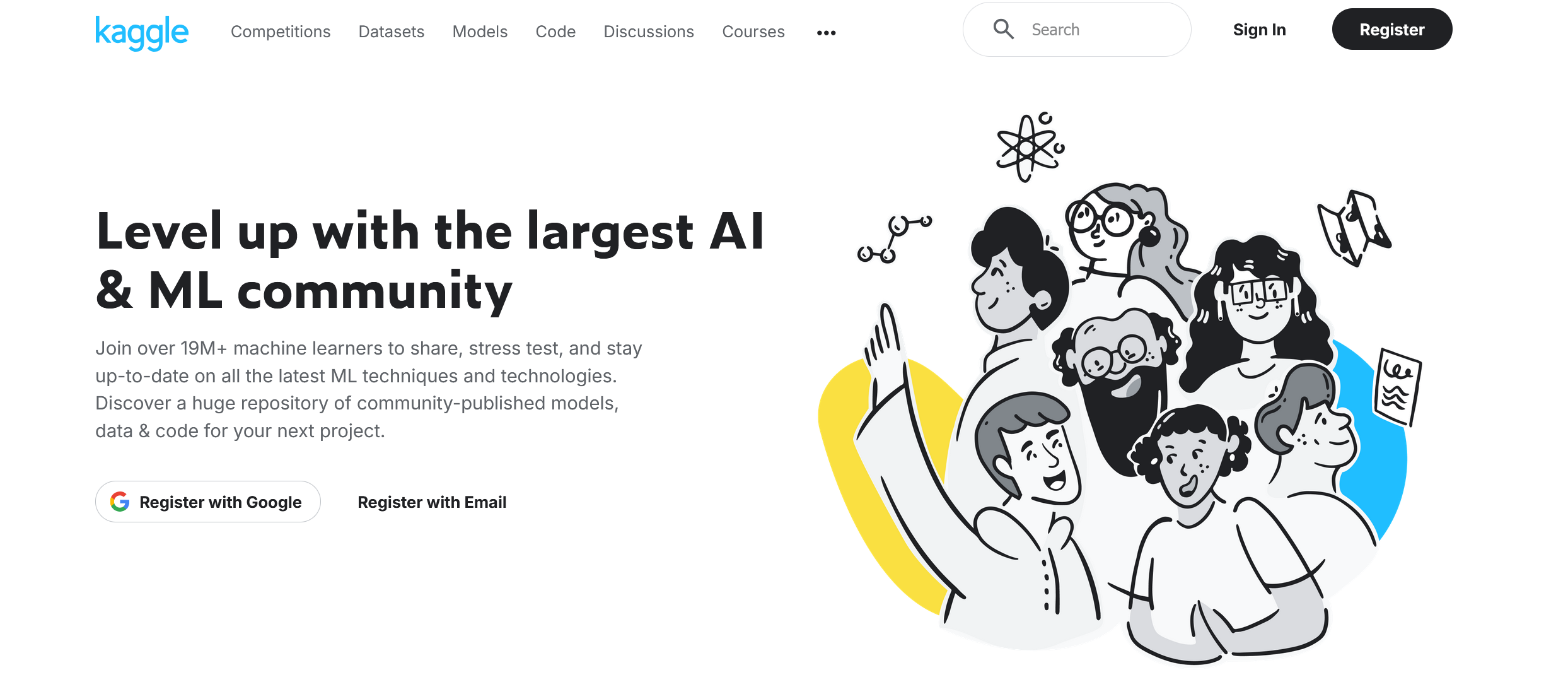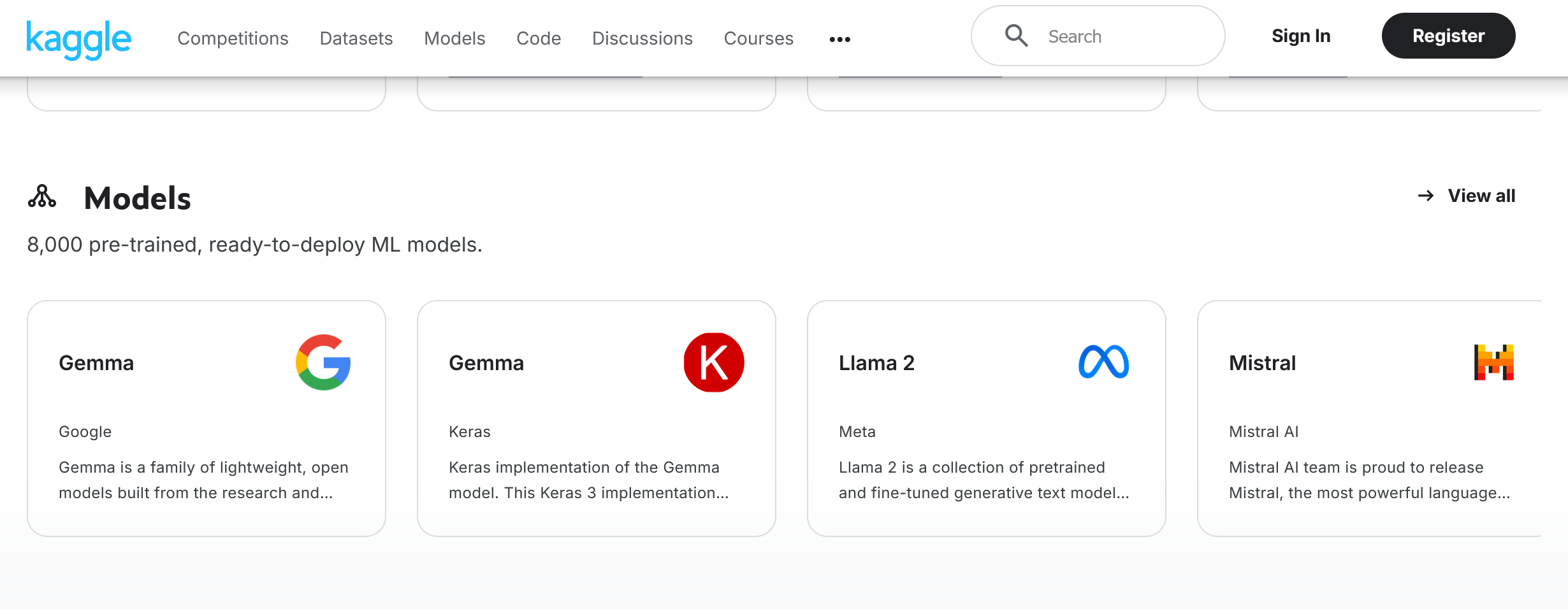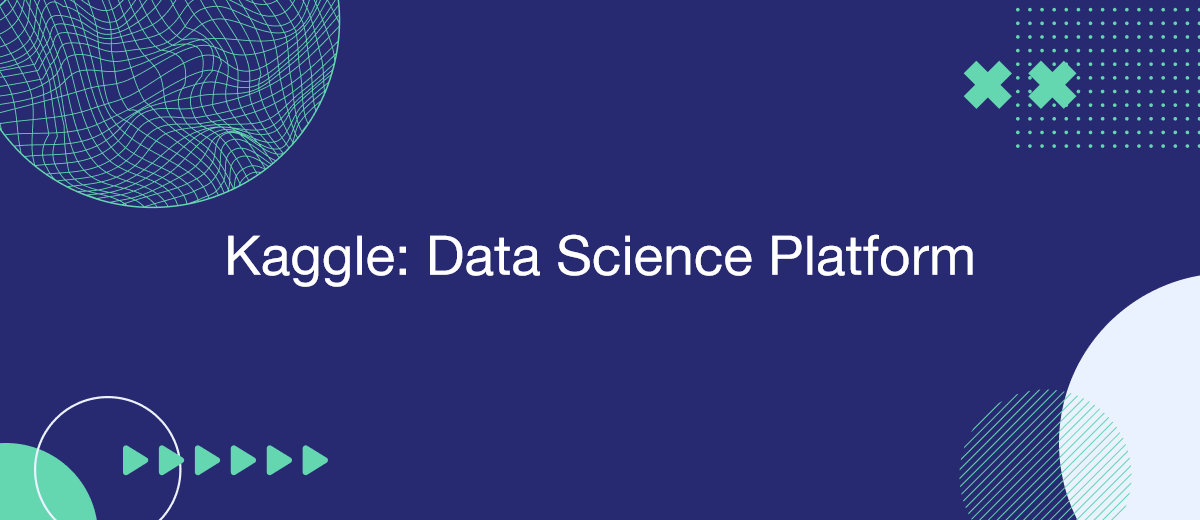The name Kaggle is probably familiar to every data scientist or ML developer. In this article, we will tell you what this platform is, what tools and resources it has, as well as what is Kaggle competition and how you can make money on them.
What is Kaggle?
Kaggle is the largest online community, crowdsourcing platform, and competition portal for data scientists, developers, and researchers of AI & ML models. With its help, professionals and enthusiasts can learn new technologies, upload and publish datasets, and also collaborate and compete in solving problems in these areas.
The project was founded by Anthony Goldbloom, Jeremy Howard, and Nicholas Gruen in 2010 in Melbourne, Australia. A year later, the company moved to Silicon Valley and received its first major round of funding of $12.5 million from a group of investors. In March 2017, Kaggle was acquired by Google and has been managed by the corporation since then. That same year, it reported its first million users, and as of 2024, the service has over 19 million registered users. In 2022, the founder of the project, Anthony Goldbloom, left the post of CEO, and D. Sculley took his place.

In February 2023, the platform introduced a new Models tool, with which developers can use pre-trained AI & ML models to solve their problems. New community members often ask — is Kaggle free? Yes, and this is an important factor in the platform's massive popularity. All its tools and capabilities are available to everyone absolutely free of charge: datasets, courses, certificates (issued after completing courses), competitions, forums and much more.
Kaggle resources are particularly popular among the following user groups:
- Students. For them, there is a library of practical courses, publicly available datasets, forums with answers to many specialized questions, and competitions for beginners.
- Developers. Can take advantage of a large catalog of open-source models, multiple datasets, public notebooks, and competition solution descriptions.
- Researchers. Have the opportunity to improve their skills in studying AI & ML technologies with the help of a hub of open-source models, datasets for their training and competitions of varying levels of complexity.
Key Features and Tools of Kaggle
The platform provides a wide range of tools and resources for data scientists, AI & ML. The main ones are:
- Competitions. Over 27,000 competitions to develop user skills, held in collaboration with world-class research organizations and companies. A wide variety of competitions are available: from medical prediction to image classification or fraudulent transaction detection. Competitors can track their positions on the leaderboard and exchange feedback with other participants.
- Datasets. What are Kaggle datasets? A vast database of organized datasets available for use, analysis, and sharing. Today, it contains over 367,000 high-quality datasets. Users can filter and find the data they need from numerous categories: computer science, education, NLP, computer vision, data visualization, etc. And also upload their datasets to the cloud.
- Models. The platform features over 7,000 pre-trained and ready-to-deploy ML models, including the most popular LLM and diffusion models. Their catalog includes many filters for sorting models by tasks performed, data type, framework, publisher, language, and other parameters.
- Code. Developers can take advantage of 1.1 million+ publicly available code snippets for AI & ML algorithms, exploring and running them using the Kaggle Notebooks module. The catalog contains code for different tasks and purposes: Python, R, GPU, TPU, for beginners, for competitions, the most trending, etc.
- Discussions. The platform offers a carefully structured knowledge base. Members can search for information on numerous topics, answer questions from other users, and ask questions to the community. Search and sorting by topic are also available.
- Courses. Kaggle Courses allows anyone to gain new knowledge and skills by studying 70+ hours of free online courses. Among them are training materials for beginner, intermediate and advanced level specialists. All courses are divided into thematic categories covering various technologies and programming languages. After completing the courses, users receive certificates confirming their qualifications.
Getting Started on Kaggle

For successful and productive mastering of Kaggle, beginners will find the following algorithm of actions useful:
- Choose a programming language. When getting to know the platform, it is worth selecting one programming language and focusing on it in the future. If you are mastering its tools from scratch, Python is considered the best option, but R is also widely in demand in the community.
- Learn the basics of working with data. Firstly, you need to learn functions for loading, running, and moving data (so-called exploratory analysis). The first steps in data science directly affect the decisions you will make when training a model. If you have selected Python, study the Seaborn library, which is designed specifically for such purposes.
- Train your first ML model. Before creating your first Kaggle machine learning projects, we recommend training the model on a simpler and more manageable dataset. This will familiarize you with ML libraries and understand the process. The best general-purpose ML library for Python is Scikit-Learn.
- Enter competitions for beginners. Competitions in the “Getting started” category are ideal for beginners, thanks to simple data sets and many educational materials. They are organized similarly to other types of competitions, but have no time limits or prize pools.
- Elevate your skills. After practicing on beginner tasks, move on to more complex competitions from the “Featured” category. Don’t chase big prizes, participate in those competitions that will teach you methods and technologies that correspond to your long-term goals.
Participating in Kaggle Competitions
Having told you what Kaggle is used for, it’s time to move on to its most important component. The platform allows data scientists and machine learning engineers to compete in creating ML models to solve specific problems or analyze specific datasets. Many of the competitions held here are organized by well-known companies and organizations that allocate significant prize funds for the winners. The algorithms developed by the participants solve a wide range of problems: from classifying images or detecting dubious financial transactions to predicting the results of medical research.
Some competitions are intended for educational and entertainment purposes, while others represent real issues that companies are trying to solve. The competitions posted in the Kaggle catalog are divided into thematic categories: active, featured, new, beginners, research, community, analytics, simulations, sandbox, etc. You can find a specific competition by name or other parameters via the search bar, or select the necessary filters. A separate category publishes competitions with limited access (Kaggle Masters), available only to top participants.
Any user of the platform can organize a Kaggle competition, with or without a prize fund. In the task, the organizer describes the issue in detail and places the input data; if necessary, the platform administrators prepare the task. Contestants upload the ML models they have developed, after which they are assessed by the customer, and their results are displayed in the leaderboard. Before the expiration of the allotted time, participants can change their applications. At the end of the competition, the organizer selects the winner and pays the prize money.
Building Your Skills with Kaggle's Learning Resources
Users of the platform can not only compete in developing ML models, but also effectively master new knowledge and skills. To achieve this, they are offered an extensive base of educational materials, including dozens of professional courses, thousands of forum topics and more than a million code fragments.
Of no less importance are the 367k+ Kaggle datasets that can be used to create machine learning algorithms. The platform provides powerful cloud resources — each developer is allocated 30 hours of GPU and 20 hours of TPU usage per week. Participants can freely download datasets from the database, upload their datasets to it, and also rate and comment on each other's data, receiving rating points for this.
A separate section of the site contains dozens of courses for beginners and experienced “kagglers”. With their help, users can master popular programming languages and AI & ML technologies. For example, there are courses on learning Python, machine learning (for beginners, intermediate, advanced levels), SQL databases, data visualization, computer vision, and other topics.
Any course can be completed absolutely safely, receiving an official certificate upon completion. In addition, the platform offers numerous useful guides for learning current languages and technologies (JAX, TensorFlow, NLP, R, Transfer Learning, etc.)
Conclusion: Making the Most of Kaggle
The Kaggle data science platform makes a significant contribution to the development of the global community of data & AI & ML developers, researchers, and enthusiasts. The resources posted on it help users to gain useful knowledge and master useful skills in this area absolutely free of charge. Of particular importance are the competitions held on the platform, which are considered its main feature. Participants hone their skills in developing machine learning models and receive solid cash prizes for their work. And the organizers of the competitions use developments to solve important problems and implement innovative technologies in many areas.
